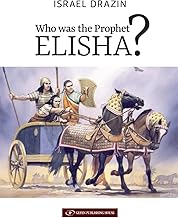Who was the Prophet Elisha? by Rabbi Dr. Israel Drazin; Gefen Publishing House; ISBN 96578-01605; 161 pages, $19.95.
By Rabbi Dr. Michael Leo Samuel

 CHULA VISTA, California — Israel Drazin’s Who Was the Prophet Elisha? is a thought-provoking exploration of one of the Bible’s most enigmatic figures. Through a blend of scholarly rigor and accessible analysis, Drazin offers a comprehensive examination of Elisha’s life, ministry, and legacy, presenting new insights into the prophet’s role in biblical narratives.
CHULA VISTA, California — Israel Drazin’s Who Was the Prophet Elisha? is a thought-provoking exploration of one of the Bible’s most enigmatic figures. Through a blend of scholarly rigor and accessible analysis, Drazin offers a comprehensive examination of Elisha’s life, ministry, and legacy, presenting new insights into the prophet’s role in biblical narratives.
His work challenges traditional views, while offering a rational, historical approach to understanding Elisha’s significance. This book stands as a valuable resource for both students of the Bible and general readers interested in deepening their understanding of biblical figures.
Drazin begins by situating Elisha within the historical and religious context of ancient Israel, examining the sociopolitical environment during the prophet’s ministry. His analysis draws from the biblical texts, particularly 1 and 2 Kings, and emphasizes the contrast between Elisha and his predecessor, Elijah. Whereas Elijah is portrayed as fiery and confrontational, Elisha emerges as a figure of stability, marked by a pragmatic and compassionate approach to his prophetic duties. Drazin highlights Elisha’s wealthier upbringing and more temperate personality as factors shaping his ministry, a departure from Elijah’s ascetic and impassioned style.
A central theme of the book is Elisha’s miraculous deeds and their theological implications. Drazin carefully analyzes well-known episodes, such as the multiplication of the widow’s oil, the raising of the Shunammite’s son, and the purification of Naaman’s leprosy. While traditional interpretations emphasize the supernatural, Drazin offers rational explanations and symbolic readings of these miracles, situating them within their historical and cultural contexts. For instance, he explores how these acts reflect Elisha’s role as a mediator of divine compassion, addressing the needs of the marginalized and demonstrating the covenantal faithfulness of YHWH.
Drazin also delves into Elisha’s political influence, examining his interactions with kings and military leaders. The prophet’s involvement in geopolitical affairs, such as advising Israelite rulers and orchestrating military strategies, underscores his dual role as a spiritual leader and a pragmatic advisor. Drazin’s analysis of Elisha’s relationship with the Israelite monarchy offers insights into the complex interplay between religion and politics in ancient Israel, highlighting Elisha’s ability to navigate these dynamics while maintaining his prophetic integrity.
A particularly compelling aspect of the book is Drazin’s treatment of Elisha’s succession from Elijah. He examines the symbolic passing of Elijah’s mantle and the double portion of Elijah’s spirit that Elisha receives, interpreting these elements as affirmations of continuity and renewal within the prophetic tradition. Drazin also addresses the theological and literary significance of Elisha’s ministry in contrast to Elijah’s, noting how Elisha’s miracles often parallel those of his mentor but with an emphasis on practical, everyday concerns rather than dramatic confrontations.
The book does not shy away from addressing the challenges and tensions in the biblical portrayal of Elisha. Drazin considers the complexity of Elisha’s character, noting moments where the prophet’s actions appear harsh or enigmatic, such as his curse on the mocking youths or his orchestration of military violence. By situating these episodes within their broader narrative and cultural framework, Drazin provides a nuanced understanding of Elisha’s motivations and the theological messages embedded in these stories.
According to Drazin, the authors of Kings convey two central messages through Elisha’s story, each shedding light on his personality and role. The first perspective is a candid acknowledgment of Elisha’s faults, highlighting his human imperfection. Despite his deep respect for Elijah and his readiness to abandon his previous life to serve as Elijah’s successor, Elisha demonstrates a tendency to assert his superiority and to respond abruptly when he perceives others as disrespectful. This trait becomes apparent early in his prophetic career and is illustrated later in 2 Kings 2:23–25, where his response to mockery exemplifies his impetuous nature.
People reading the Bible often assume its heroes were perfect people. That simply is not true. Even Moses had feet of clay and would have probably benefited from an anger management programs. But like many modern congregational rabbis, Moses had a difficult congregation!
Drazin contextualizes Elisha’s imperfections within the broader biblical theme of human fallibility. The Hebrew Bible, Drazin notes, frequently portrays even its greatest figures, including the patriarchs and prophets, as flawed. For example, Moses, revered as the greatest prophet, once insulted the Israelites out of frustration during their demand for water (Numbers 20:10–12). Similarly, King David, who holds a central role in Jewish messianic tradition, committed adultery and orchestrated the death of Bathsheba’s husband (2 Samuel 11). By presenting the shortcomings of these esteemed individuals, scripture delivers a profound message: human imperfection does not preclude greatness. Rather, it underscores that individuals, despite their mistakes, are capable of achieving remarkable deeds and fulfilling divine purposes.
The second interpretation Drazin offers focuses on the positive aspects of Elisha’s character and mission. The text of Kings, he suggests, anticipates that Elisha will surpass Elijah in the number and scope of his benevolent acts. While Elijah’s prophetic ministry is marked by dramatic and confrontational miracles, Elisha’s work often emphasizes practical, compassionate interventions that address the immediate needs of people. This forward-looking view positions Elisha as a prophet who builds upon his mentor’s legacy, expanding its scope and demonstrating an evolving understanding of the prophetic role.
Drazin’s analysis of Elisha’s dual nature—as both flawed and extraordinary—reflects the Bible’s complex approach to human character. By acknowledging Elisha’s imperfections, the narrative emphasizes his humanity, making his achievements all the more inspiring. Simultaneously, the text invites readers to view his flaws as opportunities for personal growth and as a reminder of the potential for greatness inherent in every individual.
In sum, Drazin’s interpretation of the Kings narrative presents Elisha as a deeply human figure whose imperfections coexist with his brilliance and moral integrity. This portrayal aligns with the Bible’s broader theme of flawed yet exceptional individuals, illustrating that greatness is not the absence of fault but the capacity to transcend it through dedication, compassion, and the pursuit of one’s divine calling.
*
Rabbi Michael Leo Samuel is spiritual leader of Temple Beth Shalom in Chula Vista.
Wow! This is a beautiful review of my book. Needless to say,I agree with Rabbi Dr. Samuel completely.